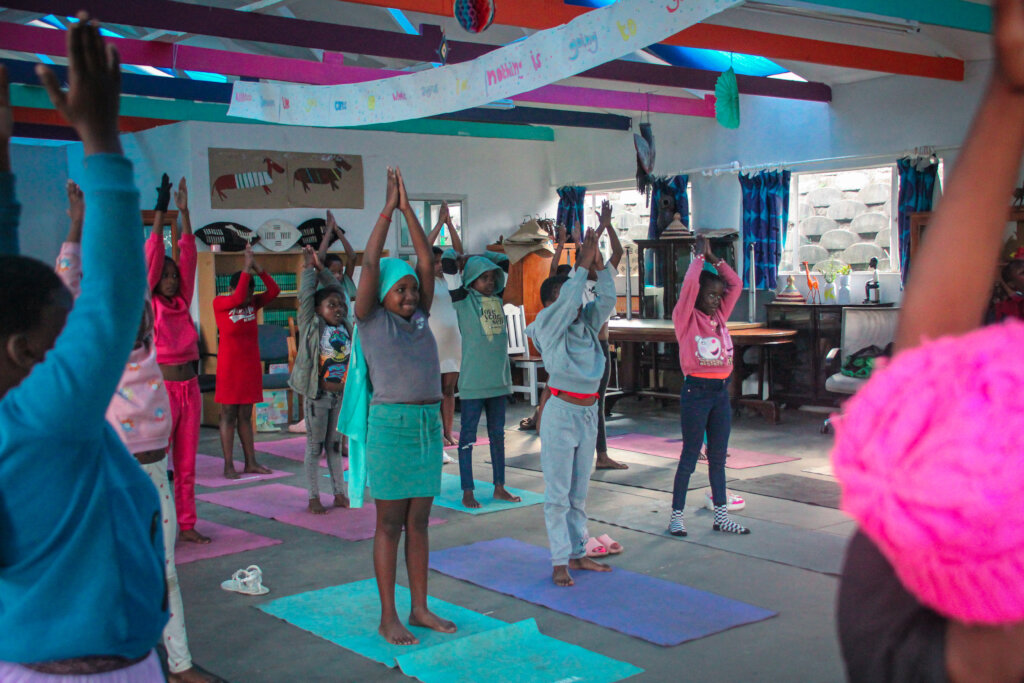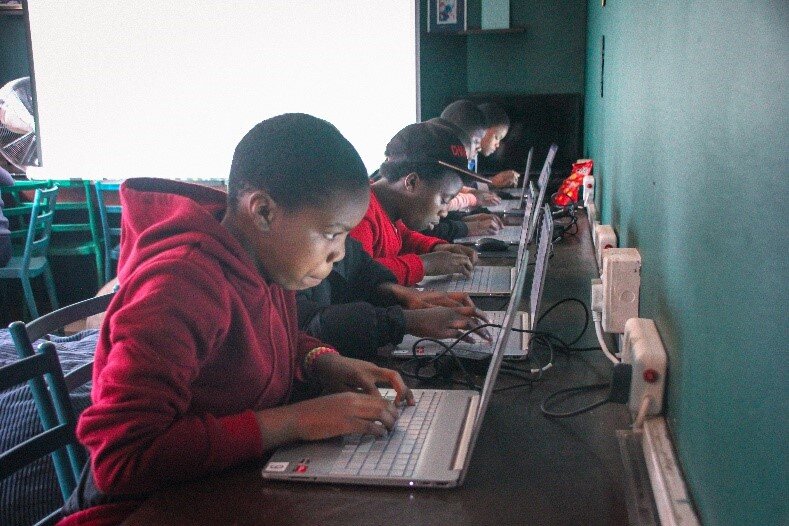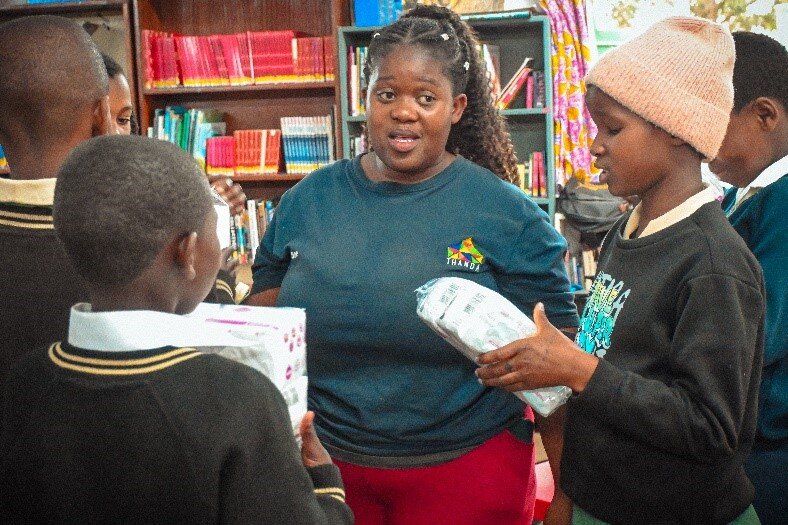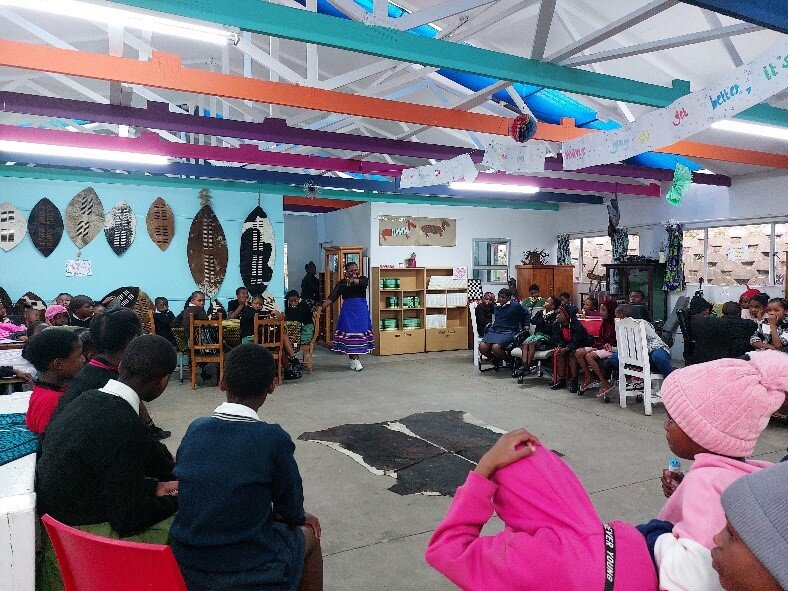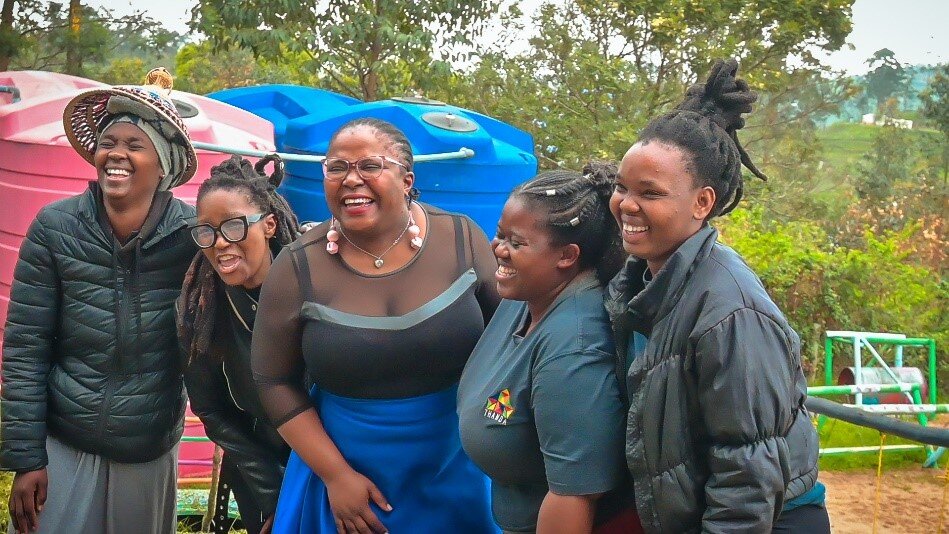By Candice McGregor | Reports and Communications Manager
As an organisation, Thanda places enormous value on monitoring and evaluation. It is important to us to understand the effectiveness of our programmes as well as children’s individual progress within them.
We use a variety of assessment tools to establish this and provide us with quantitative data in this regard. We also regularly, interview our own facilitators, children participants and guardians to gather qualitative data on what is working and what might need updating in our programmes. In addition to this, in 2024, we also commissioned a number of independent research projects so that we could better understand this through an independent lens.
We enlisted the services of contracted researcher, Sobongile Moyo, for some of these. Today we would love to share with you a summary of the research project that was done for our Girls Programme. The Girls Programme (and brother programme the Boys Programme) is a gender split programme that delves into tricky topics and important discussions during a formative period in an adolescent’s life.
The research for this project was done through focus group discussions with programme participants, with a view to gaining insight on their understanding of the programme, impact, challenges, and recommendations.
We are so pleased to share that the evaluation revealed that the Thanda Girls Programme not only provides a safe and nurturing environment for personal growth, but also fosters self-awareness, confidence, and practical skills essential for the girls’ overall development and future success.
Of participants understanding of the programme the report shares "The participants of the Girls’ Programme have a deep understanding of its purpose and benefits, which they articulate clearly through their responses. They view the programme as a transformative space that fosters personal development, builds confidence, and prepares them for the challenges of adulthood. Their insights reflect a profound appreciation for the programme's role in shaping their behaviours, attitudes, and decision-making abilities, demonstrating its effectiveness in promoting holistic development. They perceive it as a structured and supportive environment where they can learn, share, and grow."
The report provides a selection of direct quotes from participants to illustrate aspects of its findings
“The Girls Programme is a programme aimed at raising girls in terms of developing their minds, decision-making, and preparing them for the challenges they will face and how they can solve those problems” (Girl #1)
and
“What I like about the Girls Programme is that as we grow, we face challenges, and the programme teaches us how to handle them.” (Girl #15).
The report shows that the Girls Programme is seen as a place where girls can freely discuss topics related to their development, such as physical changes and social expectations. One girl elaborated, “We discuss things as girls, like what happens as you grow up and what you should do.” The report advises that participant responses of this nature show a clear picture that the sharing of knowledge helps the participants feel prepared for the various stages of their lives. It also creates a sense of camaraderie among the girls, as they navigate similar challenges together. Another participant highlighted the importance of this shared knowledge by saying, “You gain knowledge about how a girl develops into an adult.” (Girl #6) Later, the same girl added “I like that we can talk and be free, no one judges anyone else.” (Girl #6).
A few topics stood out during the focus groups with mention within the report. Below are some extracts:
"Financial Literacy and Digital Literacy. The inclusion of financial literacy in the curriculum is a standout feature of the programme, as it equips the girls with practical skills that are crucial for their future independence. Learning to manage money is an empowering experience for these young girls, many of whom are introduced to budgeting and saving for the first time. Girl #8 pointed out,
“What I love about the programme is that it helps me with things that are important in life, like how to manage money.” (Girl #8)
Hygiene and Puberty. The girls are also taught the importance of maintaining personal hygiene, especially during their menstrual cycles. This is particularly important for those who are beginning menstruation, as one participant shared,
“We were taught that when you are menstruating, you should not show other people but you can tell your parent.” (Girl #9)
These lessons go beyond physical cleanliness, instilling a sense of privacy, dignity, and self-respect. Another girl emphasized,
“Maintaining cleanliness is important so that germs do not spread.” (Girl #10)
And another,
“The programme teaches us how our bodies change, how we change, our hormones, and how we start to feel about boys.” (Girl #12)
Cultural Awareness and Identity. Cultural education is a crucial element of the programme. The girls are exposed to different cultural practices and their significance. By learning about different cultural practices, the girls gain a deeper understanding of their own identities and learn to appreciate and respect the traditions of others, which is helpful in fostering social cohesion and cultural pride. One participant highlighted a lesson on cultural rituals, saying,
“We learned about cultures from other places where girls' breasts are pressed by hot stones so that they do not show and their teeth are made sharp to show boys that the girl is now an adult.” (Girl #13)
Moreover, activities like Zulu traditional dance are incorporated to reinforce cultural identity and self-pride. One participant (Girl #7) expressed how engaging in these activities makes her feel, stating, “It makes me proud of my culture.” This focus on cultural expression helps the girls develop a strong sense of identity and belonging, which is important for their self-esteem and confidence. By celebrating their traditions, the programme not only strengthens their cultural roots but also fosters a sense of unity and pride within the group."
The curriculum is important and it is clear through participant feedback that it is much loved. According to the report, the success of the programme is not due to the curriculum alone, though, as the facilitators also play a significant role.
"The facilitators of the Girls Programme are instrumental in creating a nurturing and supportive environment for the participants. Their role goes beyond simply delivering the programme content; they act as mentors and role models, compassionately providing guidance and support. One participant expressed her admiration for the facilitators, stating,
“I love her because she’s not someone who shares your secrets.” (Girl #18)
And another,
“What I like about her is that she doesn’t judge you when you say something.” (Girl #19)
While most of their girls only had positive things to share about the programme, when asked, some of them were able to pick out various challenges. The challenges raised being lack of rest time due to late nights around the fire during overnight stays, the unfairness of group punishments when one or a few girls are troublesome, strict facilitators and transportation issues. Thanda management are reviewing the challenges raised to understand how we can meet the girls’ expectations where possible.
The report concluded as follows:
"The Thanda Girls Programme has had a profound impact on the lives of its participants, equipping them with essential life skills, building their confidence, and fostering a strong sense of cultural identity. By providing comprehensive support in areas such as health education, personal development, and practical skills, the programme has created a nurturing environment where girls are empowered to thrive. Participants have demonstrated significant growth in their ability to express themselves openly, navigate the challenges of adolescence, and develop positive social behaviours. One of the programme’s key strengths lies in its holistic approach, which not only focuses on individual development but also extends its influence to participants’ families, promoting a culture of learning and resilience within the broader community."
We hope that you have enjoyed reading what was uncovered during the course of independent researcher, Sobongile’s, project. It is tremendously validatiing to know that children feel a sense of safety within our programmes and that the girls’ own experiences and feelings reflect the values and intention of the programme itself.
By Candice McGregor | Reports and Communications Manager
By Candice McGregor | Reports and Communications Manager
Project reports on GlobalGiving are posted directly to globalgiving.org by Project Leaders as they are completed, generally every 3-4 months. To protect the integrity of these documents, GlobalGiving does not alter them; therefore you may find some language or formatting issues.
If you donate to this project or have donated to this project, you can receive an email when this project posts a report. You can also subscribe for reports without donating.
Support this important cause by creating a personalized fundraising page.
Start a Fundraiser